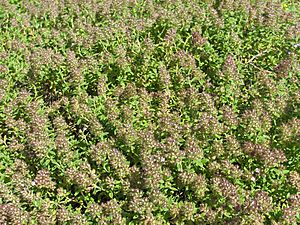Thymus praecox facts for kids
Quick facts for kids Thymus praecox |
|
|---|---|
 |
|
| Scientific classification |
|
| Kingdom: | Plantae |
| Clade: | Tracheophytes |
| Clade: | Angiosperms |
| Clade: | Eudicots |
| Clade: | Asterids |
| Order: | Lamiales |
| Family: | Lamiaceae |
| Genus: | Thymus |
| Species: |
T. praecox
|
| Binomial name | |
| Thymus praecox Opiz
|
|
| Script error: The function "autoWithCaption" does not exist. | |
| Synonyms | |
|
List
|
|
Script error: No such module "Check for conflicting parameters".
Thymus praecox is a type of thyme plant. It's often called mother of thyme. You might also hear it called "creeping thyme" or "wild thyme". These names are also used for another plant, Thymus serpyllum. This plant grows naturally in central, southern, and western Europe.
Contents
About Thymus praecox
Thymus praecox belongs to the Thymus group of plants. Scientists place it in a specific part of this group called the Serpyllum section. Sometimes, it has been given a different scientific name, T. polytrichus.
Different Types of Thymus praecox
Just like there are different kinds of apples, there are different types of Thymus praecox. These are called subspecies and cultivars. Here are a few examples:
- Thymus praecox subsp. praecox
- Thymus praecox 'Doone Valley' (This one is now thought to be a mix of two plants, called a hybrid.)
- Thymus praecox 'Minus'
- Thymus praecox 'Pseudolanuginosus'
- Thymus praecox subsp. arcticus (Sometimes called Thymus polytrichus subsp. britannicus)
- Thymus praecox subsp. arcticus 'Albus' (This one has white flowers.)
- Thymus praecox subsp. arcticus 'Languinosus' (This type is fuzzy or "woolly".)
- Thymus praecox subsp. arcticus 'Hall's Woolly'
- Thymus praecox subsp. arcticus 'Pink Chintz' (This one is now considered a type of Thymus serpyllum.)
- Thymus praecox subsp. polytrichus: You can find this type growing wild in Bosnia.
- Thymus praecox subsp. skorpilii: This type also grows wild in Bosnia.
How People Use Thymus praecox
Growing Thymus praecox in Gardens
Thymus praecox is a popular ornamental plant. This means people grow it because it looks nice. It's an evergreen plant, so it stays green all year. Gardeners often use it as a groundcover, which means it spreads out low to the ground. You can see it in gardens or in pots.
It's also great for filling spaces between paving stones on patios and walkways. Once it's grown, it doesn't need much water, which means it's drought-tolerant.
Sometimes, this plant (and Thymus serpyllum) has grown outside of gardens in North America. In some places in the United States, it can become a weed or an invasive species. This means it grows where it's not wanted and can sometimes take over from native plants.
Cooking with Thyme
This type of thyme has a strong smell, much like Oregano. Because of its scent, it can be used in cuisine (cooking).
Like other thyme plants, T. praecox can have different kinds of essential oils inside. These oils give plants their unique smells and flavors. Plants that have different oil makeups are called chemotypes. In one area, you might find a mix of these different types. For example, studies in places like Iceland and England show that these different chemotypes can be found across many countries, not just in one small area.
Images for kids
-
Thymus praecox near Seyðisfjörður, Iceland. It is known locally as blóðberg, meaning "bloodstone".
-
Thymus praecox in July in Lonsoraefi, Iceland.
See also
 In Spanish: Serpol serrano para niños
In Spanish: Serpol serrano para niños
 | Tommie Smith |
 | Simone Manuel |
 | Shani Davis |
 | Simone Biles |
 | Alice Coachman |



